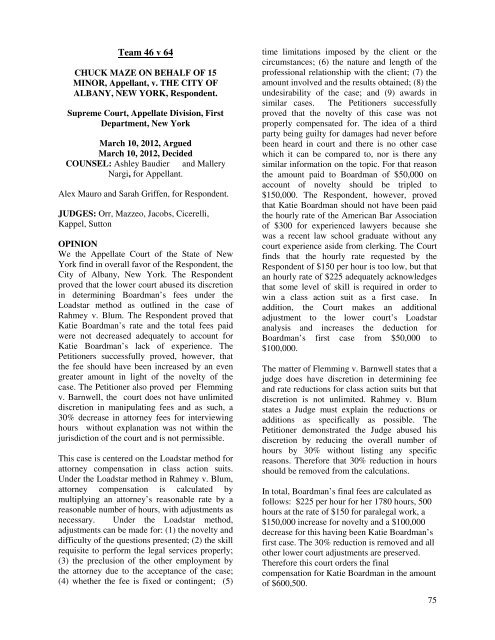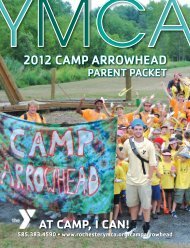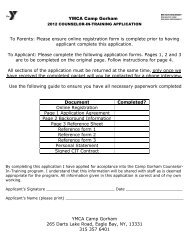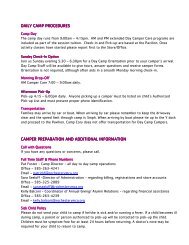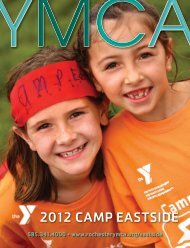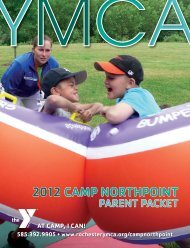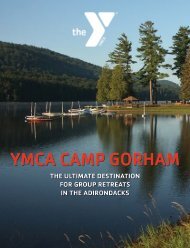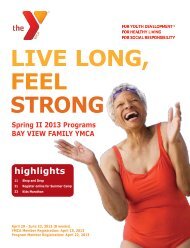2012 Conference Executive Record Report.pdf - YMCA of Greater ...
2012 Conference Executive Record Report.pdf - YMCA of Greater ...
2012 Conference Executive Record Report.pdf - YMCA of Greater ...
Create successful ePaper yourself
Turn your PDF publications into a flip-book with our unique Google optimized e-Paper software.
Team 46 v 64<br />
CHUCK MAZE ON BEHALF OF 15<br />
MINOR, Appellant, v. THE CITY OF<br />
ALBANY, NEW YORK, Respondent.<br />
Supreme Court, Appellate Division, First<br />
Department, New York<br />
March 10, <strong>2012</strong>, Argued<br />
March 10, <strong>2012</strong>, Decided<br />
COUNSEL: Ashley Baudier and Mallery<br />
Nargi, for Appellant.<br />
Alex Mauro and Sarah Griffen, for Respondent.<br />
JUDGES: Orr, Mazzeo, Jacobs, Cicerelli,<br />
Kappel, Sutton<br />
OPINION<br />
We the Appellate Court <strong>of</strong> the State <strong>of</strong> New<br />
York find in overall favor <strong>of</strong> the Respondent, the<br />
City <strong>of</strong> Albany, New York. The Respondent<br />
proved that the lower court abused its discretion<br />
in determining Boardman’s fees under the<br />
Loadstar method as outlined in the case <strong>of</strong><br />
Rahmey v. Blum. The Respondent proved that<br />
Katie Boardman’s rate and the total fees paid<br />
were not decreased adequately to account for<br />
Katie Boardman’s lack <strong>of</strong> experience. The<br />
Petitioners successfully proved, however, that<br />
the fee should have been increased by an even<br />
greater amount in light <strong>of</strong> the novelty <strong>of</strong> the<br />
case. The Petitioner also proved per Flemming<br />
v. Barnwell, the court does not have unlimited<br />
discretion in manipulating fees and as such, a<br />
30% decrease in attorney fees for interviewing<br />
hours without explanation was not within the<br />
jurisdiction <strong>of</strong> the court and is not permissible.<br />
This case is centered on the Loadstar method for<br />
attorney compensation in class action suits.<br />
Under the Loadstar method in Rahmey v. Blum,<br />
attorney compensation is calculated by<br />
multiplying an attorney’s reasonable rate by a<br />
reasonable number <strong>of</strong> hours, with adjustments as<br />
necessary. Under the Loadstar method,<br />
adjustments can be made for: (1) the novelty and<br />
difficulty <strong>of</strong> the questions presented; (2) the skill<br />
requisite to perform the legal services properly;<br />
(3) the preclusion <strong>of</strong> the other employment by<br />
the attorney due to the acceptance <strong>of</strong> the case;<br />
(4) whether the fee is fixed or contingent; (5)<br />
time limitations imposed by the client or the<br />
circumstances; (6) the nature and length <strong>of</strong> the<br />
pr<strong>of</strong>essional relationship with the client; (7) the<br />
amount involved and the results obtained; (8) the<br />
undesirability <strong>of</strong> the case; and (9) awards in<br />
similar cases. The Petitioners successfully<br />
proved that the novelty <strong>of</strong> this case was not<br />
properly compensated for. The idea <strong>of</strong> a third<br />
party being guilty for damages had never before<br />
been heard in court and there is no other case<br />
which it can be compared to, nor is there any<br />
similar information on the topic. For that reason<br />
the amount paid to Boardman <strong>of</strong> $50,000 on<br />
account <strong>of</strong> novelty should be tripled to<br />
$150,000. The Respondent, however, proved<br />
that Katie Boardman should not have been paid<br />
the hourly rate <strong>of</strong> the American Bar Association<br />
<strong>of</strong> $300 for experienced lawyers because she<br />
was a recent law school graduate without any<br />
court experience aside from clerking. The Court<br />
finds that the hourly rate requested by the<br />
Respondent <strong>of</strong> $150 per hour is too low, but that<br />
an hourly rate <strong>of</strong> $225 adequately acknowledges<br />
that some level <strong>of</strong> skill is required in order to<br />
win a class action suit as a first case. In<br />
addition, the Court makes an additional<br />
adjustment to the lower court’s Loadstar<br />
analysis and increases the deduction for<br />
Boardman’s first case from $50,000 to<br />
$100,000.<br />
The matter <strong>of</strong> Flemming v. Barnwell states that a<br />
judge does have discretion in determining fee<br />
and rate reductions for class action suits but that<br />
discretion is not unlimited. Rahmey v. Blum<br />
states a Judge must explain the reductions or<br />
additions as specifically as possible. The<br />
Petitioner demonstrated the Judge abused his<br />
discretion by reducing the overall number <strong>of</strong><br />
hours by 30% without listing any specific<br />
reasons. Therefore that 30% reduction in hours<br />
should be removed from the calculations.<br />
In total, Boardman’s final fees are calculated as<br />
follows: $225 per hour for her 1780 hours, 500<br />
hours at the rate <strong>of</strong> $150 for paralegal work, a<br />
$150,000 increase for novelty and a $100,000<br />
decrease for this having been Katie Boardman’s<br />
first case. The 30% reduction is removed and all<br />
other lower court adjustments are preserved.<br />
Therefore this court orders the final<br />
compensation for Katie Boardman in the amount<br />
<strong>of</strong> $600,500.<br />
75


